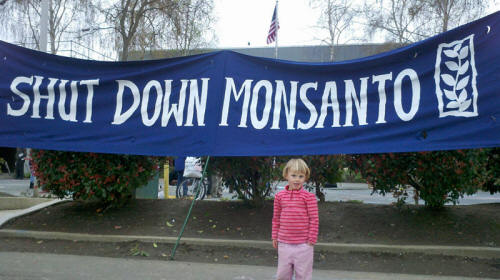|
by Madison Ruppert Editor May 13, 2013 from EndTheLie Website
A banner at an anti-Monsanto demonstration in 2012 (Image credit: nickbuxton/Flickr)
The Supreme Court unanimously backed patents on “self-replicating technology” like Monsanto’s Roundup Ready soybeans on Monday and along with it, backed the controversial licensing agreement preventing farmers from using seeds more than once.
This comes not even two months after Congress passed the so-called “Monsanto Protection Act,” which was later signed into law by Obama. One senator even apologized for the bill after public outcry.
This case, Bowman v. Monsanto Co. et al., specifically concerned Monsanto’s patented genetically modified soybeans but it very well might be extended to similar products like Monsanto’s popular Roundup Ready corn.
Yet when writing for the court, Justice Elena Kagan made it clear that it does not address every self-replicating product.
The Court ruled against 74-year-old Indiana farmer Vernon Hugh Bowman who signed contracts pledging to not save seeds from his crops, guaranteeing that he has to buy new seeds every year.
According to The New York Times, Bowman,
While those seeds are usually sold for animal feed, industrial uses or food processing, Bowman planted them and sprayed the crops with Roundup.
When certain plaints survived, Bowman would save the seeds for further plantings, cutting into Monsanto’s profits.
Initially, a federal judge ordered Bowman to pay Monsanto over $84,000 for his violation and he fought it all the way to the Supreme Court.
While Bowman claimed that a concept called patent exhaustion allowed him to use the products as he pleased since he obtained them legally, Kagan said it didn’t apply to the way he used Monsanto’s seeds.
When the Obama administration - which has a tight relationship with Monsanto - wrote an amicus brief, the administration said that the Court shouldn’t worry about the fact that this decision could have troubling implications for traditional farming techniques.
Usually, farmers freely use parts of a previous harvest to produce the next but the Obama administration said that Congress is “better equipped than this court” to consider such issues.
The Court unequivocally sided with Monsanto in the case, protecting their business model from what the corporation claimed would mean its very doom.
Anti-Monsanto demonstrations part of the worldwide “March Against Monsanto” are going to occur later this month.
Thus far, protests are planned in over 40 countries.
|

